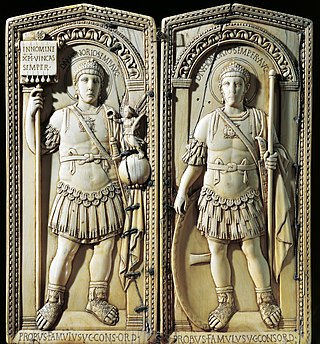Bibliography
- John Robert Martindale, Arnold Hugh Martin Jones, John Morris, "Anicius Auchenius Bassus 7", The Prosopography of the Later Roman Empire , Volume 2, Cambridge University Press, 1992, ISBN 0-521-20159-4, pp. 219–220.
Anicius Auchenius [1] Bassus (fl. 408) was a politician of the Roman Empire. In 408, he was appointed consul. [2] According to B. L. Twyman, he represents the "mainline" of the gens Anicia. [3]
Bassus was probably the son of the Anicius Auchenius Bassus who was praefectus urbi in 382–383 and of Turrenia Honorata. He had a son, also called Anicius Auchenius Bassus, consul in 431. [4] He wrote the epigraph for the tomb of Monica, Augustine of Hippo's mother. [5] The actual stone on which it was written was rediscovered in 1945 in the church of Santa Aurea, in Ostia Antica. [6]

The praetorian prefecture of Italy was one of four praetorian prefectures into which the Late Roman Empire was divided. It comprised the Italian peninsula, the western Balkans, the Danubian provinces and parts of North Africa. The Prefecture's seat moved from Rome to Milan and finally, Ravenna.
Anicius Hermogenianus Olybrius was a politician and aristocrat of the Roman Empire.
Anicius Auchenius Bassus may refer to:
Amnius Manius Caesonius Nicomachus Anicius PaulinussignoHonorius was a politician of the Roman Empire.
Anicius Faustus was a Roman senator who was appointed consul in AD 298.

Lucius Valerius Septimius Bassus was a Roman politician.
The gens Anicia was a plebeian family at ancient Rome, mentioned first towards the end of the fourth century BC. The first of the Anicii to achieve prominence under the Republic was Lucius Anicius Gallus, who conducted the war against the Illyrians during the Third Macedonian War, in 168 BC.

Anicius Petronius Probus was a politician of the Western Roman Empire.
Anicia Faltonia Proba was a Roman noblewoman of the gens Anicia.
The gens Caecinia was a plebeian family of Etruscan origin at ancient Rome. Members of this gens are first mentioned in the time of Cicero, and they remained prominent through the first century of the Empire, before fading into obscurity in the time of the Flavian emperors. A family of this name rose to prominence once more at the beginning of the fifth century.
Anicius Auchenius Bassus was a politician of the Roman Empire.
Flavius Anicius Auchenius Bassus was a high official of the Western Roman Empire. He was appointed as consul by the Western court with Antiochus Chuzon as a colleague. In 435 he held for the second time the office of praetorian prefect of Italy.
(Anicius) Maximus was a Roman senator and patrician during the Ostrogothic kingdom, who celebrated the last games in the Flavian Amphitheater.
Anicius Probinus was a politician and aristocrat of the Roman Empire.
Aurelius Anicius Symmachus was a politician of the Western Roman Empire belonging to the Roman families of the Anicii and of the Symmachi. In 415 he was proconsul of Africa and between 24 December 418 and January 420 he was praefectus urbi of Rome.
Flavius Anicius Olybrius was a Roman politician. He was appointed to the post of consul for the year 526, which he held without a colleague.
Flavius Bassus Herculanus was an aristocrat and a politician of the Western Roman Empire, husband of Justa Grata Honoria. He was honoured with the consulate in 452 with Sporacius as his colleague.
Antiochus Chuzon, called "the Elder" to distinguish him from his nephew, was a high official of the Eastern Roman Empire, praetorian prefect of the East and consul, who was a key figure in the compilation of the Codex Theodosianus.
The gens Rufia, occasionally spelled Ruffia, was a minor plebeian family at ancient Rome. Members of this gens are not mentioned in history until imperial times, and they achieved little prominence until the late third century, from which time the family rose in importance, gaining the consulship on a number of occasions from the time of Constantine the Great to that of Justinian, and frequently holding the post of praefectus urbi.